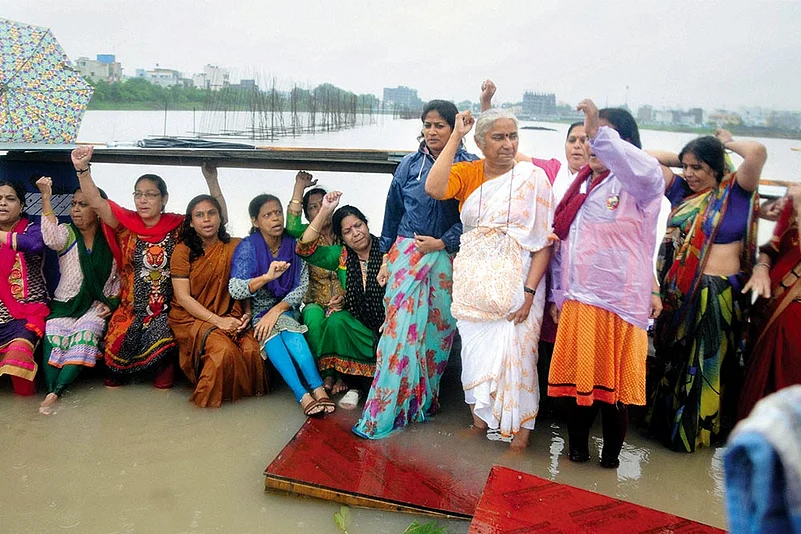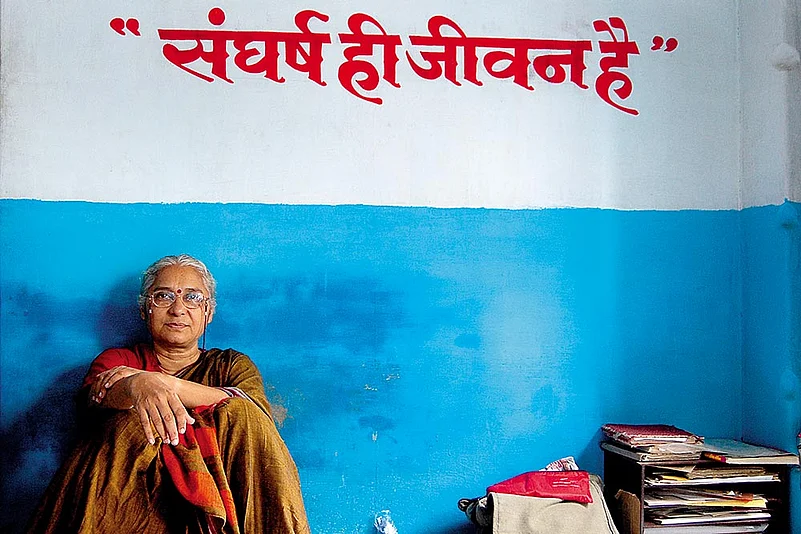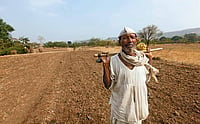It’s quite late in the evening by Nashik standards, past 9 pm. The gathering at Hutatma Smarak has waited patiently for Medha Patkar and is now agog as she starts speaking. She, visibly tired, fires off right away—a short recap of the latest agitation along with facts and figures, follow-up action with background, historical context of the issues. She then asks for suggestions and support from those present. Her days and nights are busy—public meetings, court cases, agitations, discussions with supporters and workers, appointments with officials. Patkar has been at it for 30 years with Narmada Bachao Andolan (NBA), protesting against large dams such as Sardar Sarovar on the river and demanding justice for the displaced. In the past few years, she has also been pleading cases on her own. Besides the NBA, she has also led movements elsewhere—for example, against constructions at Lavasa, the “private, planned city” being built near Pune, and against slum demolitions in Mumbai. She has skipped dinner tonight in Nashik to accommodate one more meeting. Tomorrow, she would be meeting the Nashik district collector early in the morning, followed by a press conference. It is from such a tight schedule that she took some time out for speaking to Outlook. The challenges are getting tougher and the impact weaker—the “manzil”, as she describes the movement’s goal, seems to have moved a step farther. But Patkar shows no signs of slowing down. Her energy and her enduring commitment to her ideals are unmistakable in this conversation with Prachi Pinglay-Plumber. Edited excerpts:
You are protesting against more villages getting submerged in the dam waters yet again. After all these years, do you feel the struggle is back to square one?
Yes, that’s our dilemma. At one level, the movement touched hearts and souls—not just of people in the Narmada valley, but also of supporters from many social strata and many countries. Arousing public consciousness over development-related issues was an achievement. Poorna manzil (the goal in its entirety) was difficult to achieve anyway. And yet we couldn’t celebrate what we did achieve as we could never halt or take a pause or relax—the system, moving in exactly the opposite direction from our way of thinking, made that impossible. It is happening everywhere in this globalised world, though I speak for what is happening in our country. We could easily understand the policies and politics in the name of development that resulted in the Sardar Sarovar dam. All the issues we had been raising have unfolded grimly over the years. For instance, have proper environmental impact studies been completed? The answer is still no. The studies were not in-depth and the system’s callousness was terrible and scary, except for some sensitive officers. We had to get to the bottom of it, we had to dig out every small detail, we couldn’t leave anything half-way.
Yes, I am too tired physically, but what really pulls us down is the mental fatigue—a result not of frustration or disappointment, but the stress and shock we have to face at every step. We have to connect micro to macro and move forward, but as we are still stuck in this rut, we can’t just say, ‘Let us soar over all this because this is not so important.’ This is the third generation in the movement and we can’t just leave the people. Fathers tell their sons to take over the meetings. You can’t win the battle between truth and falsehood just by doing satyagraha. Unless the struggle makes an impact, how does one go on? Mahatma Gandhi had Mountbatten—someone who responded. Today we don’t have that. This government’s lack of interest in dialogue is baffling. They think that is the way they will kill the movement. But they are wrong. They are exploiting our resources, so there will be resistance. The people cannot be silent. Our psychological state does get to breaking point sometimes. We have to think if we should challenge the micro details or hit at the larger picture instead. Whether it is a farmers’ struggle or a movement to save a river, we have to arrive at the right balance. Yes, it’s very difficult.
You have founded an alliance, the National Alliance of People’s Movements (NAPM). How tough has it been?
There are egos and compromises, so national alliance-building processes are very delicate. It is easier to make a community rise up and fight than getting a community of organisations and movements to come together and stay together. However, when the threat becomes so critical, as it has become with a BJP government in power, organisations also come forward to build alliances. Besides commitment to ideology and issues, there is a need for commitment to, and strategies for, coming together and staying together. We get tired due to the shocks—that’s how the system inflicts internal injuries, even when there are no external wounds.
We take a stand on all issues—education, labour laws, infrastructure, electricity, unionisation.... We support different movements irrespective of whether we are working on that issue specifically. Despite the alliances, the situation today is like finding a huge mountain in front of you after you have walked for miles and miles. It is a mountain of crude political intentions in the garb of a development agenda. Propaganda that development is for the people is gaining ground even while they are giving away our resources to the corporates. Unfortunately, we are not media-savvy—I grew up in a trade unionist’s house and we are still painting walls. We didn’t even put out our posters during the election campaign for the sake of ideals. People told me I fought elections like a fool.
Has the balance tilted in favour of urbanisation?
Every prime minister starts with the promise of inclusive growth, but in reality it is absolutely exclusive injustice. I came from a Rashtra Seva Dal background; my father was a freedom fighter. We cannot compromise with the principles of non-violence. The ideological framework and commitment was always there among many of us. The movement was going beyond us. We kept saying this is not just about one project, but about the idea of development. We expected the movement would change things. As time goes by, the State is becoming more and more insensitive, and unaccountable even to the government’s voters.

You tried to join mainstream politics by becoming a member of the Aam Aadmi Party and contesting an election. Why did that end bitterly?
I tried to contest just once. The experience only proved what I had been saying for long: strengthening people’s movements is more important than any other political move. Electoral politics is bereft of values. Even if you win, not only would your questions not be answered, you would also feel cheated in the end. Even if you make a hungama inside, it won’t make any long-term impact. In contrast, people’s movements have a long-term impact and keep the seed of the vision protected. That’s why you feel you can go on beyond generations.
The five-year limited representation gets you much less, and you might end up as one of them. No matter how strenuous and difficult the path of people’s movements may be, that is the road leading to the manzil, not politics. That’s what I have realised.
What do you see as your big successes?
There have been successes all along. Construction at Lavasa was stopped. NCP leader Chhagan Bhujbal’s sugar factory was closed. Many judge success in terms of money and benefits. We are not rejecting those, because they matter from the common people’s point of view. Our commitment, however, goes beyond those gains. We know money cannot bring permanent change. We are happy when there are partial successes, but we also realise what the next step should be. It’s not a level playing field. Governments don’t even adhere to court judgements these days.
Has the judiciary disappointed you?
We are seeing all four pillars of democracy melt away. A movement like Chipko, where you hugged trees to save them, won’t work now. The values and ideals of society have changed. Our experience with the judiciary is mixed. Legal battles are fought strategically, not always on merit. However, some high court justices have given us patient hearing and tried to understand the issues. The recent death of (former CJI) P.N. Bhagwati marks the end of the era of judges who also went down to the grassroots for inspection.
Corporates control the media now. And there’s more: overall privatisation is really killing the space for public movements, voices and expressions. The plurality of expressions through agitations creates space for the disadvantaged sections of the society. When this space is shrinking and the mainstream media is so controlled, the social media need to be tapped. We have not done so well on that front, but traditional ways of raising voices are not working. Today’s media needs gimmicks and superficial, flashy news. Sadly, news about movements such as ours are not sensational.
How do you look at your personal life? Have you had to dilute your idealism to be more pragmatic?
I don’t repent because I have thought through every decision. I know many women manage home and the work front, but andolan means revolutionising yourself and everyone around you, besides challenging the system constantly. It demands every ounce of your life. Unresponsive government and shrinking space are a reality, but you can’t compromise. The image built through your work has to be impeccable for you to continue in a movement in the long term.

We have been talking about illegal sand mining, and ‘Medha’s JCBs are in the mines’ hit the headlines. It was shocking. Important developments get missed so many times, but this was flashed everywhere. Then they clarified the next day, saying there was no connection between me and illegal sand mining. I sent them a legal notice anyway. When something like this happens, your conscience, courage and commitment become clearer and stronger. The shake-up is necessary and the system has been providing it.
Demolishing a house and depriving people of shelter is violence, but they call it development. At the root of this violence is the nexus of corporates, politicians and the mafia. We have a slogan: “Sarkar humse darti hai, police ko aage karti hai” (the government fears us and puts the police in between). Courage comes from people like Premalbehen and Shyama Machwara, who have been in the movement for years and make fiery speeches. Or the adivasi girls, who seem to live in their own worlds, but work like nobody else during agitations. The way they stood in the water to protest the dam-induced destruction of the Narmada was INSpiring. We were in the water for 28 hours and our legs would start shaking. These people are more inspiring than gurus who promise salvation.
Our network is fully voluntary and most activists are under 30. For interns, this movement becomes a university within a university. Consumerism has increased and the middle class and the upper middle class have succumbed to it. They probably face the dilemma that if they consume the bottled water of a company, how will they protest against it. But there are still millions of youngsters who believe in fighting against injustices and inequities. That keeps the movement going.


























